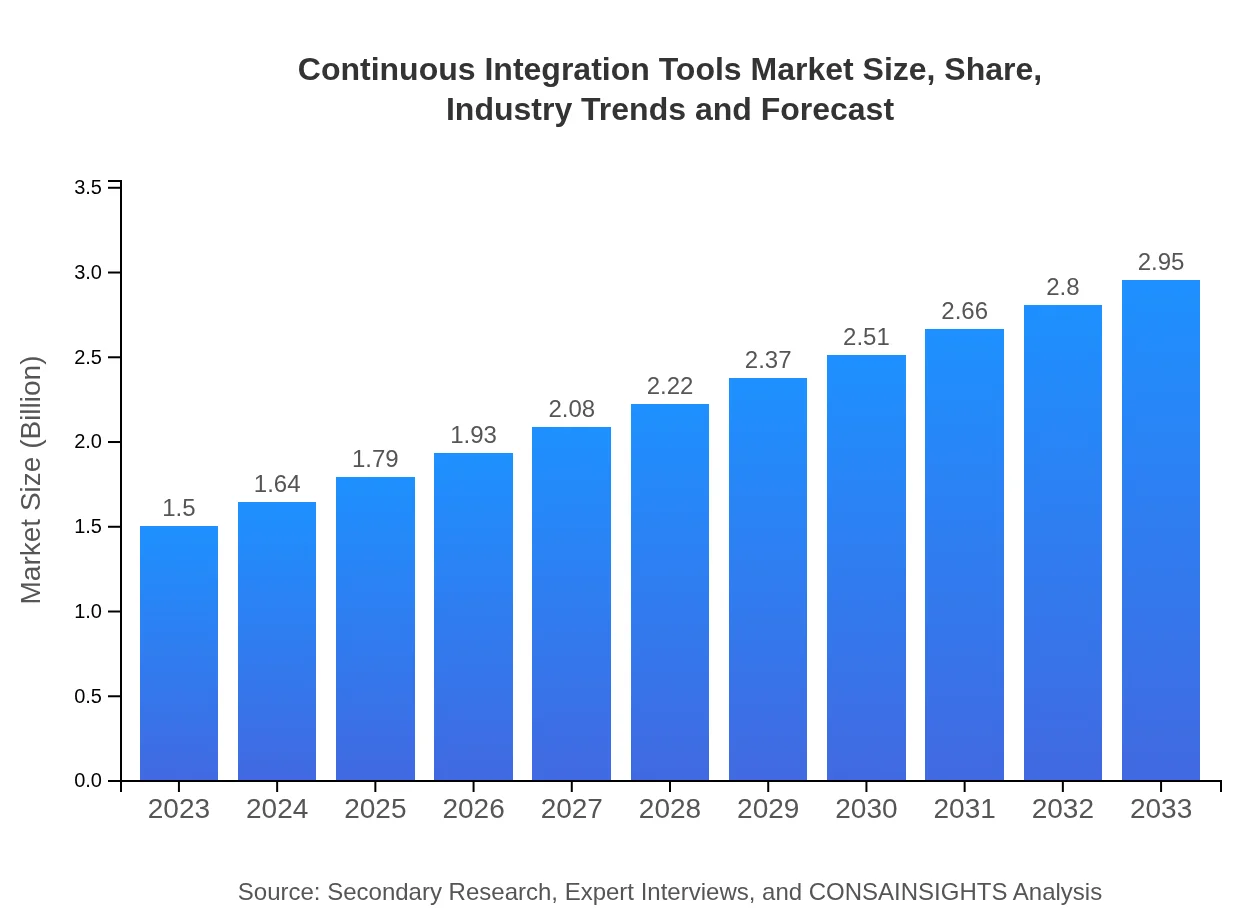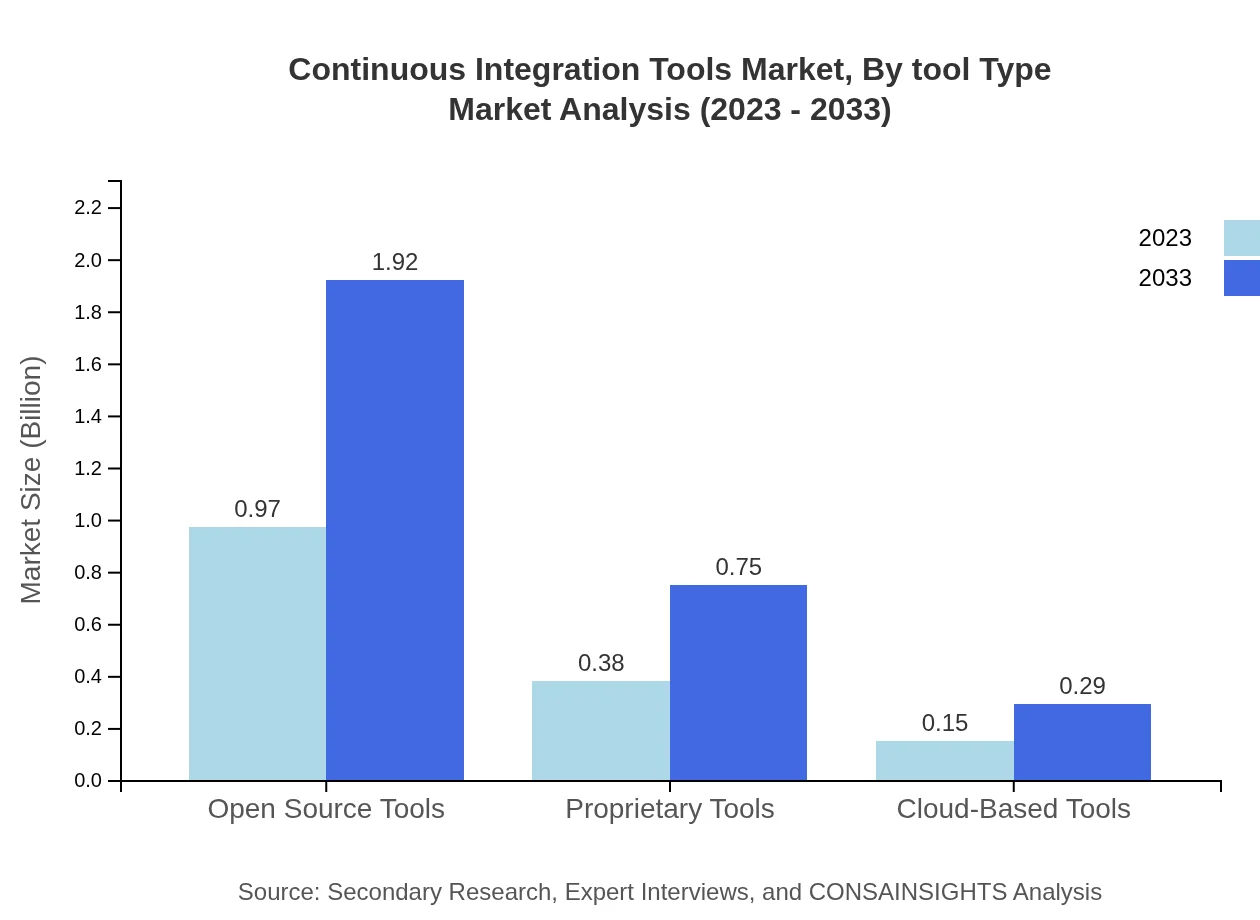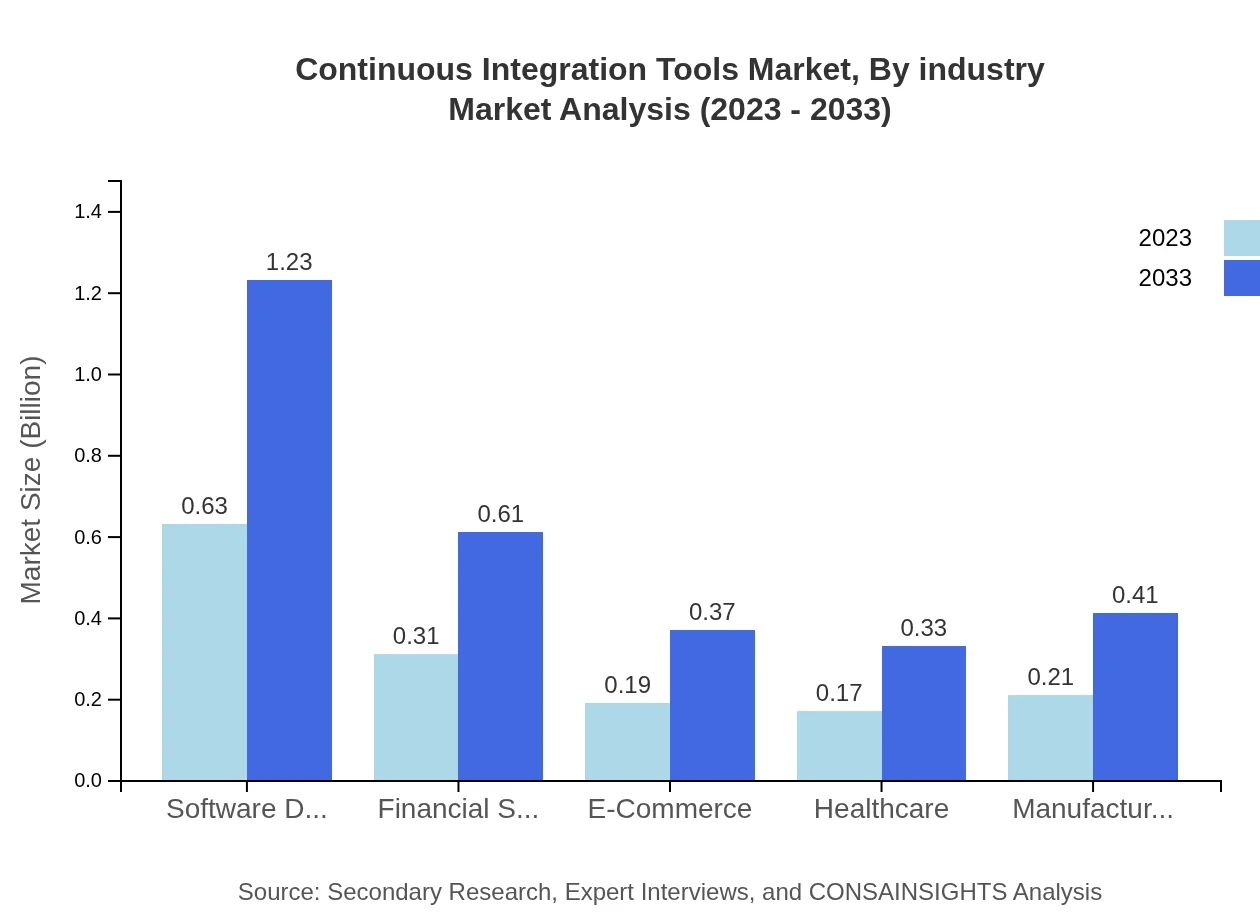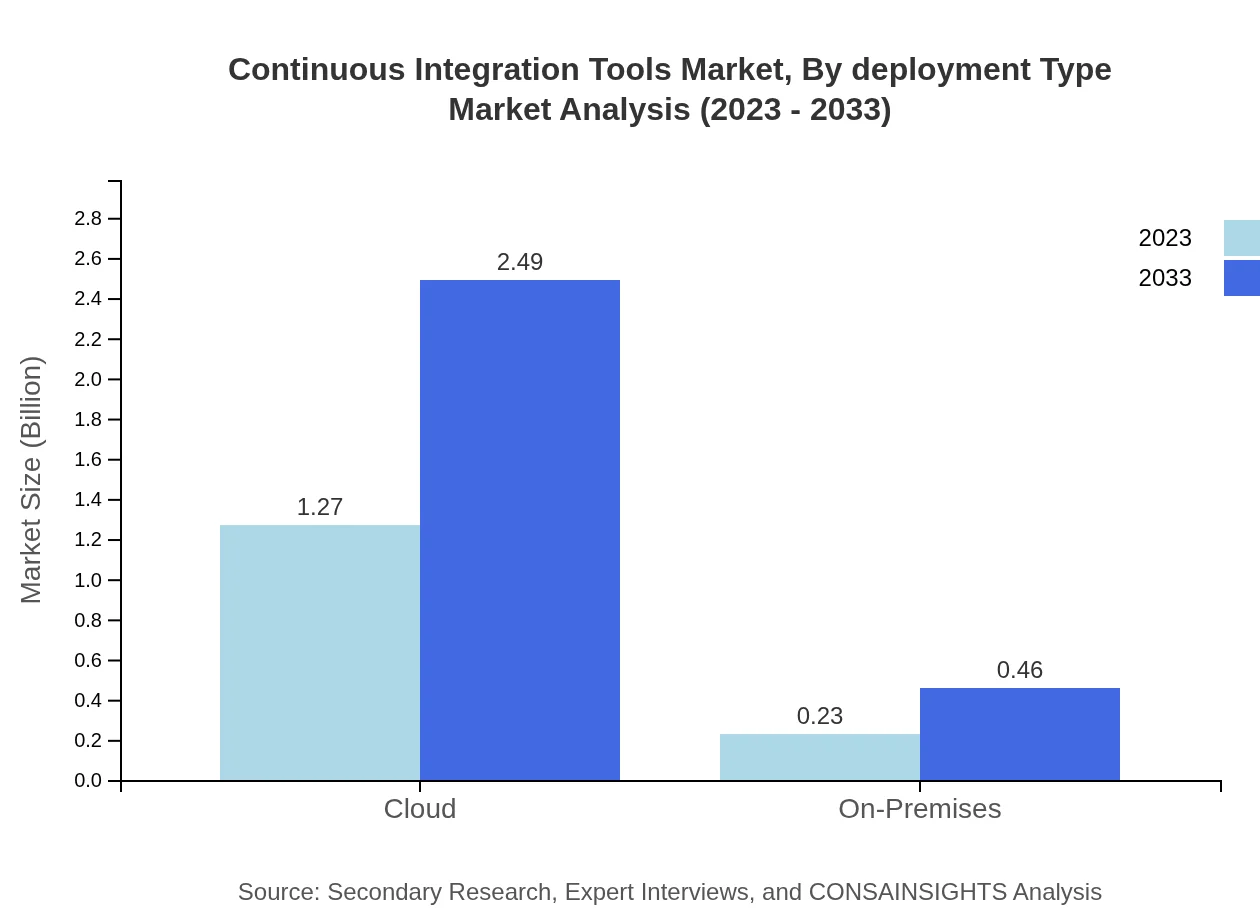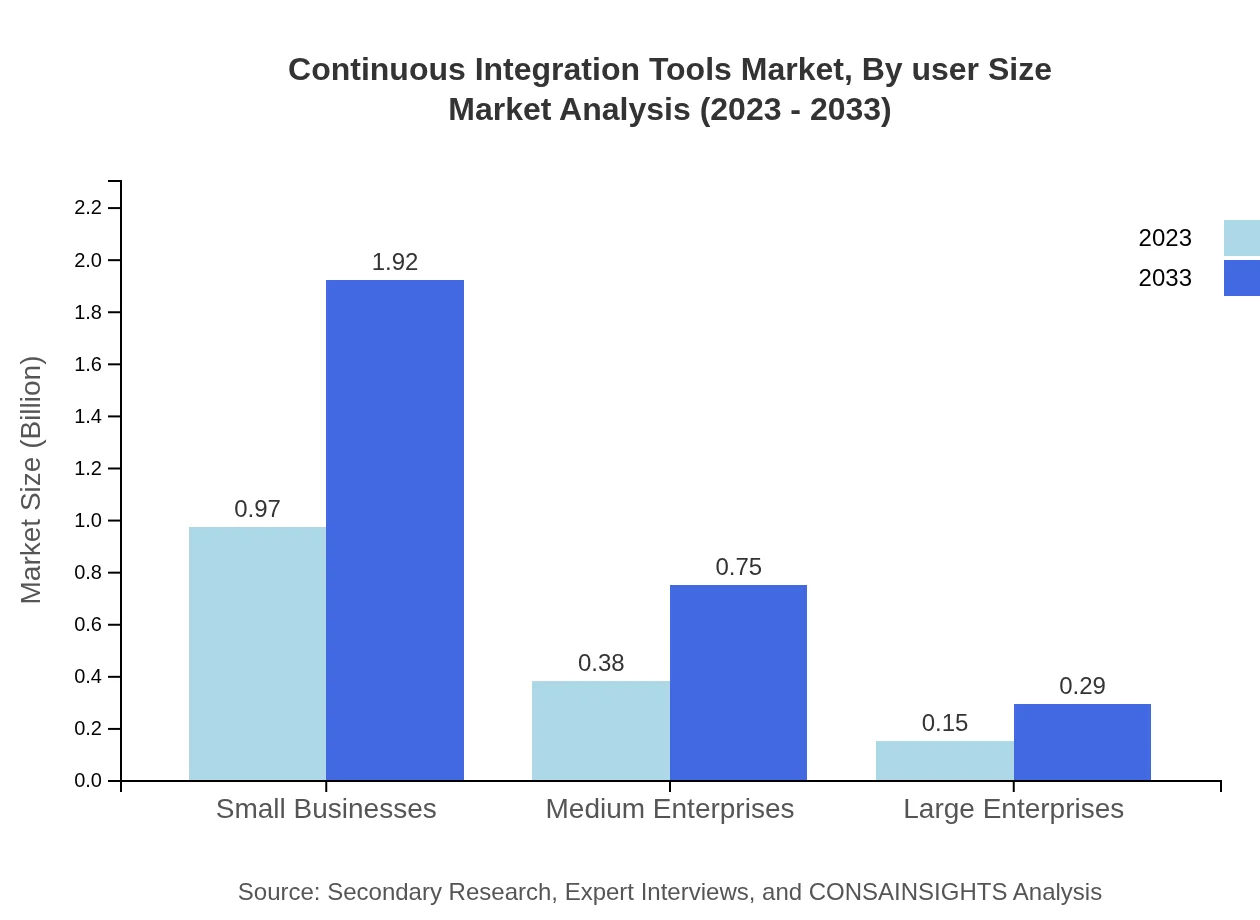Continuous Integration Tools Market Report
Published Date: 31 January 2026 | Report Code: continuous-integration-tools
Continuous Integration Tools Market Size, Share, Industry Trends and Forecast to 2033
This market report provides a comprehensive analysis of the Continuous Integration Tools industry, covering market size, trends, segmentation, regional insights, and forecasts from 2023 to 2033.
| Metric | Value |
|---|---|
| Study Period | 2023 - 2033 |
| 2023 Market Size | $1.50 Billion |
| CAGR (2023-2033) | 6.8% |
| 2033 Market Size | $2.95 Billion |
| Top Companies | Jenkins, Travis CI, CircleCI, GitLab CI/CD, Bamboo |
| Last Modified Date | 31 January 2026 |
Continuous Integration Tools Market Overview
Customize Continuous Integration Tools Market Report market research report
- ✔ Get in-depth analysis of Continuous Integration Tools market size, growth, and forecasts.
- ✔ Understand Continuous Integration Tools's regional dynamics and industry-specific trends.
- ✔ Identify potential applications, end-user demand, and growth segments in Continuous Integration Tools
What is the Market Size & CAGR of Continuous Integration Tools market in 2023?
Continuous Integration Tools Industry Analysis
Continuous Integration Tools Market Segmentation and Scope
Tell us your focus area and get a customized research report.
Continuous Integration Tools Market Analysis Report by Region
Europe Continuous Integration Tools Market Report:
The European market for Continuous Integration Tools is forecasted to expand from $0.49 billion in 2023 to $0.97 billion by 2033. Increasing investment in IT infrastructure and a growing preference for DevOps practices among European businesses signify a promising outlook for the market in this region.Asia Pacific Continuous Integration Tools Market Report:
The Asia Pacific region is expected to experience significant growth in the Continuous Integration Tools market, with projections indicating a rise from $0.28 billion in 2023 to $0.54 billion by 2033. The rapid digital transformation in countries like India and China, coupled with an increasing number of software development firms, is driving the demand for CI tools in this region.North America Continuous Integration Tools Market Report:
North America remains the largest market for Continuous Integration Tools, with a size of $0.56 billion in 2023 projected to grow to $1.09 billion by 2033. The presence of major technology companies and a strong focus on innovation and software quality assurance contribute to this robust growth.South America Continuous Integration Tools Market Report:
In South America, the market is estimated to grow from $0.05 billion in 2023 to $0.10 billion in 2033. The growing awareness of automation in software development processes and the shift towards Agile methodologies among businesses in this region are expected to fuel this growth.Middle East & Africa Continuous Integration Tools Market Report:
In the Middle East and Africa, the CI tools market is likely to increase from $0.12 billion in 2023 to $0.24 billion by 2033. The emergence of tech startups and the growth of the e-commerce sector are driving the adoption of CI tools across various industries.Tell us your focus area and get a customized research report.
Continuous Integration Tools Market Analysis By Tool Type
The Continuous Integration Tools market can be analyzed based on tool types, which include: Open Source Tools ($0.97 billion in 2023 projected to $1.92 billion in 2033, capturing 64.99% market share), Proprietary Tools ($0.38 billion in 2023 to $0.75 billion in 2033, 25.32% market share), and Cloud-Based Tools ($0.15 billion in 2023 to $0.29 billion in 2033, 9.69% market share). Open Source tools dominate the market due to their flexibility, community support, and growing popularity among developers seeking cost-effective solutions.
Continuous Integration Tools Market Analysis By Industry
In terms of industry segmentation, the Software Development sector leads the market with a size of $0.63 billion in 2023, projected to reach $1.23 billion by 2033, representing a 41.69% market share. Other notable sectors include Financial Services ($0.31 billion to $0.61 billion, 20.74% share), E-Commerce ($0.19 billion to $0.37 billion, 12.54% share), Healthcare ($0.17 billion to $0.33 billion, 11.17% share), and Manufacturing ($0.21 billion to $0.41 billion, 13.86% share). The handling of complex software projects and regulatory compliance needs boosts the demand for CI tools across these industries.
Continuous Integration Tools Market Analysis By Deployment Type
The market is further segmented by deployment type, with Cloud-based tools leading the segment ($1.27 billion in 2023 to $2.49 billion in 2033, 84.38% market share), followed by On-Premises solutions ($0.23 billion in 2023 to $0.46 billion in 2033, 15.62% share). The gradual migration to cloud environments and the increasing importance of remote collaboration drive the adoption of cloud-based CI tools, making them the preferred choice for many organizations.
Continuous Integration Tools Market Analysis By User Size
User size segmentation reveals that Small Businesses account for a significant portion of the market ($0.97 billion in 2023 to $1.92 billion in 2033, 64.99% market share), followed by Medium Enterprises ($0.38 billion to $0.75 billion, 25.32% share) and Large Enterprises ($0.15 billion to $0.29 billion, 9.69% share). Small businesses are increasingly adopting CI tools to streamline their development processes and achieve competitive advantages.
Continuous Integration Tools Market Trends and Future Forecast
Tell us your focus area and get a customized research report.
Global Market Leaders and Top Companies in Continuous Integration Tools Industry
Jenkins:
Jenkins is an open-source automation server that provides hundreds of plugins to support building, deploying, and automating projects, making it one of the most popular CI tools in the industry.Travis CI:
Travis CI is a continuous integration service used to build and test software projects hosted on GitHub, known for its seamless integration and support for various programming languages.CircleCI:
CircleCI provides cloud-based CI/CD solutions, enabling developers to automate their deployment pipelines and improve software delivery speed and quality.GitLab CI/CD:
GitLab CI/CD is a fully integrated continuous integration and delivery tool within GitLab, offering a comprehensive solution for automation from planning to monitoring projects.Bamboo:
Bamboo by Atlassian is a CI/CD server that integrates with other Atlassian products to provide a comprehensive pipeline for developing, testing, and deploying software.We're grateful to work with incredible clients.









FAQs
What is the market size of Continuous Integration Tools?
The global Continuous Integration Tools market is projected to grow from $1.5 billion in 2023 to an estimated size reflecting a CAGR of 6.8% through 2033, indicating robust growth in the tech landscape.
What are the key market players or companies in the Continuous Integration Tools industry?
Key players in the Continuous Integration Tools market include notable companies like Jenkins, CircleCI, GitLab, Travis CI, and Atlassian, which are pivotal in providing innovative solutions to streamline software development processes.
What are the primary factors driving the growth in the Continuous Integration Tools industry?
Factors driving growth include the increasing demand for efficient software development practices, the surge in DevOps adoption, the need for automation in testing, and the ongoing digital transformation across various sectors.
Which region is the fastest Growing in the Continuous Integration Tools market?
North America is currently the fastest-growing region, projected to rise from $0.56 billion in 2023 to $1.09 billion by 2033. Other notable growth is seen in Europe and Asia Pacific, reflecting strong market engagement.
Does ConsaInsights provide customized market report data for the Continuous Integration Tools industry?
Yes, ConsaInsights offers tailored market report data to meet specific client requirements in the Continuous Integration Tools industry, enabling detailed insights relevant to individual business needs.
What deliverables can I expect from this Continuous Integration Tools market research project?
Expect comprehensive reports detailing market trends, competitive analysis, consumer insights, regional performance metrics, and forecasts that aid decision-making processes in the Continuous Integration Tools sector.
What are the market trends of Continuous Integration Tools?
Current trends include a shift towards cloud-based solutions, increased adoption of open-source tools, and a focus on integrating AI capabilities to enhance deployment efficiency within Continuous Integration Tools.

